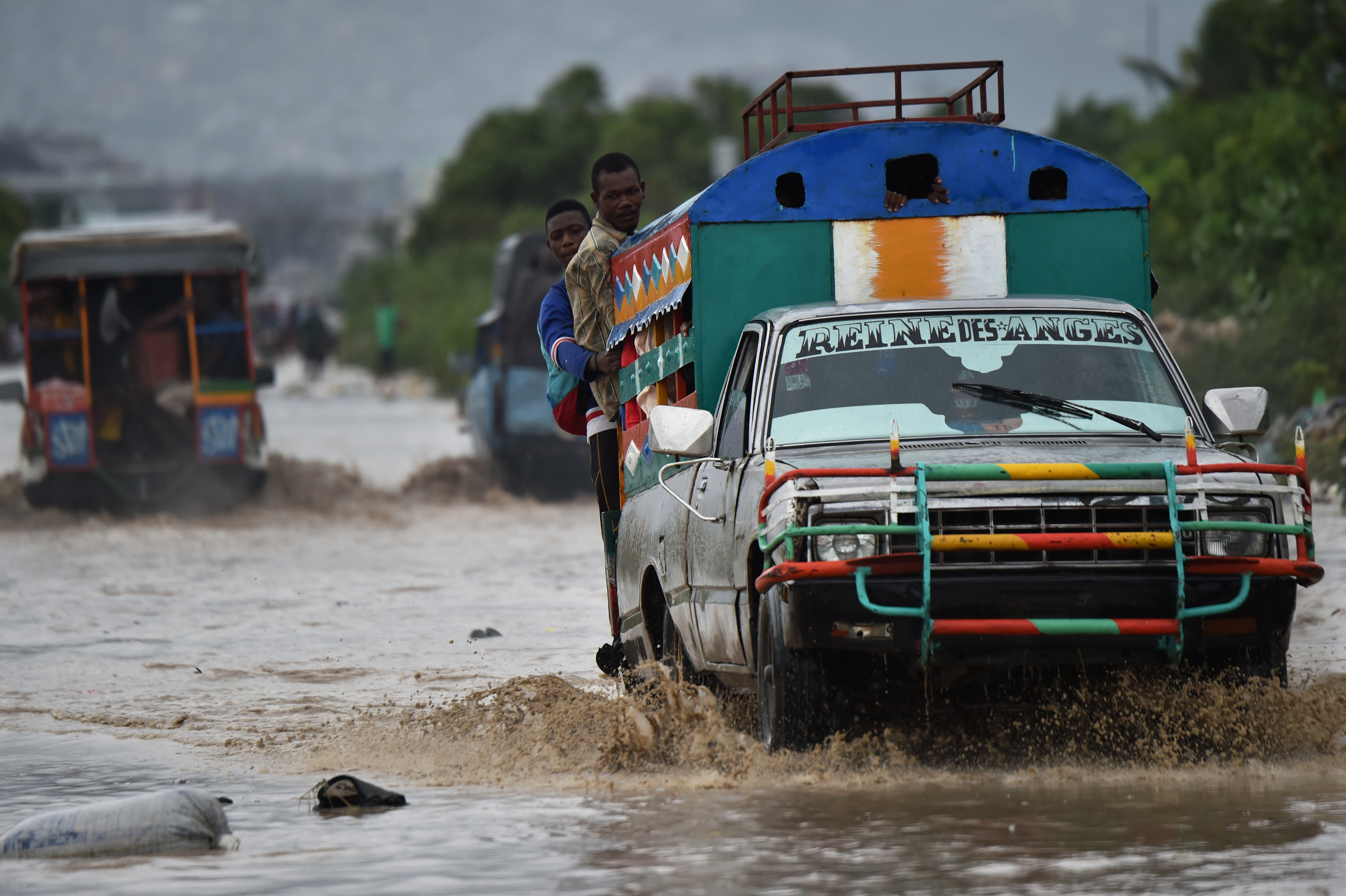
Hurricane Matthew slammed into Haiti, triggering floods and forcing thousands to flee the path of a storm that has already claimed three lives in the poorest country in the Americas. / AFP PHOTO /
by Amelie BARON
PORT-AU-PRINCE, Haiti (AFP) — Hurricane Matthew pummeled Haiti and moved on to Cuba after killing seven people, unleashing floods and forcing hundreds of thousands to flee the Caribbean’s worst storm in nearly a decade.
Far to the north, the first evacuations were ordered in the United States as coastal dwellers prepared to flee the approaching monster storm, expected off the East Coast later this week.
The death toll stood at seven — three in Haiti and four in the Dominican Republic — but was certain to rise as dangerous Matthew bruised its way north.
The full scope of the damage, both human and material, remained unclear. Civil protection officials in Haiti said they were struggling to communicate with the south after Matthew’s furious wind and rain blew down telephone lines.
The collapse of a bridge cut off the only road linking Port-au-Prince to the peninsula that makes up southern Haiti.
“It’s going to be difficult to find an alternative route,” civil protection spokesman Edgar Celestin told AFP.
Next in line, Cuba was hit late in the afternoon on its eastern tip.
The storm’s eye made landfall around 0000 GMT, moving toward the north near 15 kilometers (nine miles) per hour, the US National Hurricane Center said.
Americans girded for a taste of nature’s fury. South Carolina said it would start evacuating 1.1 million people from its coast starting Wednesday and try to get them at least 160 kilometers inland. Georgia declared a state of emergency in 13 counties.
“It’s not going to be a fast evacuation. It could take up to several hours,” South Carolina Governor Nikki Haley said. “If you can leave early, do that.”
‘Extremely dangerous’
Matthew made landfall in Haiti shortly after daybreak as an “extremely dangerous” Category Four storm — the maximum is five — near the southwestern town of Les Anglais, packing top winds of around 230 kilometers per hour, the US National Hurricane Center said.
It marked the first time in 52 years that a Category Four storm made landfall in Haiti.
Even before making landfall along the southern edge of a jagged peninsula on Hispaniola — the island that Haiti shares with the Dominican Republic — Matthew was blamed for at least three deaths in Haiti, with fears that the toll could climb.
Four more deaths were reported later in the Dominican Republic, where officials said 200 homes were damaged.
After Cuba, the storm is expected to hit the Bahamas late Tuesday or Wednesday.
It was forecast to dump 38 to 63 centimeters (15 to 25 inches) of rain over southern Haiti with up to a meter possible in isolated areas, and has been blamed for triggering mudslides.
The key port of Les Cayes, the country’s third city is “very seriously damaged,” said Hervil Cherubin, Haiti director for the aid group Heifer International. “Most roofs of houses, shops, gas stations are all gone.”
“Businesses near the ocean have totally disappeared, washed away,” he added, with farms “disappeared” and livestock killed.
The country is home to almost 11 million people, many living in fragile housing.
Thousands are still living in tents in Haiti after the country’s massive earthquake in 2010. Erosion is especially dangerous because of high mountains and a lack of trees and bushes in areas where they have been cut for fuel.
More than 9,000 Haitians were evacuated to temporary shelters at area schools and churches, the Interior Ministry said.
But civil protection forces have struggled with locals who refused to leave some of the most vulnerable areas, where residents face serious flooding risks.
Schools will remain closed until Monday, but the authorities have not said whether long-delayed presidential and legislative elections scheduled for Sunday will still take place.
First deluge, then mudslides
Matthew already holds the longevity record for a Category Four and Five hurricane in the Caribbean, according to meteorologist Philip Klotzbach of the Colorado State University.
It is expected to move past Cuba during the night.
Officials reported significant flooding and waves up to five meters (16 feet) in coastal villages in the east — but no casualties so far.
The authorities evacuated some 1.3 million people.
One stalwart who stayed, 63-year-old Roberto Gates, ventured out to buy rum. “I have food for today and tomorrow, and then we’ll see,” he said.
The United States Agency for International Development (USAID) dispatched an elite disaster response team to the Bahamas, Haiti and Jamaica.
It is also sending some $400,000 in assistance to aid groups in Haiti and Jamaica and emergency relief supplies including blankets, plastic sheeting and water containers.
The Pentagon said 700 family members were evacuated over the weekend to Florida from the US naval base in Guantanamo Bay, on Cuba’s eastern tip.
Forecasters predict the hurricane could hit the US East Coast around midweek. Florida, South Carolina and parts of North Carolina have also declared states of emergency.
President Barack Obama postponed a trip to South Florida, where he had planned to attend a campaign event in support of Democratic presidential candidate Hillary Clinton.
“If #Matthew directly impacts FL there will be massive destruction that we haven’t seen in years,” Florida Governor Rick Scott said on Twitter.
© 1994-2016 Agence France-Presse








